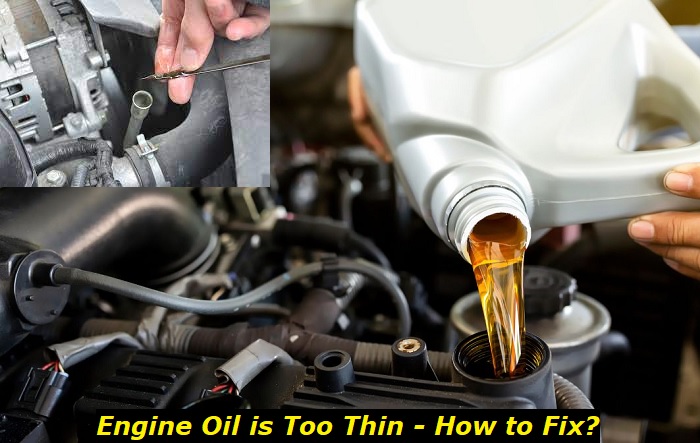If your oil is too thin in the engine, this will cause low oil pressure, poor lubrication of engine head units, harsh work of the oil pump, and quick engine wear. The bad thing is that there are almost no immediate symptoms like a changed sound of engine work or some warning light on your dash.
Oil viscosity problems highlights
- Level of urgency:medium
- Average mileage:not related to mileage
- Repair cost:$250 - $350
- DIY repair:possible
- Commonreasons:wrong oil, wrong mechanic's advice
- Ifignored:reducing the lifespan of the engine
- How to solve:justchange the oil and use the recommended or OEM type

How can thin oil get into your engine?
You may be surprised but there are thousands of drivers who love experimenting with car maintenance. They believe that car manufacturers only want that their vehicles would be broken as soon as possible and people would go to buy other vehicles in dealerships. Although this wild though has some solid base under it, I want to assure you that the recommended type of oil is always the best option.
But here are some ways that the too-thin oil can get into your engine:
- you may want to experiment with the viscosity of oil because you read some clever thoughts on forums or heard from friends;
- your mechanic decides that this type of oil is better for your car;
- the person in the car parts store wants to sell this oil and advertises it as the best option for your engine;
- you order this type of oil online by mistake and then think that there is no difference;
- there was some mistake in the process of maintenance and the mechanic filled your engine with the wrong type of oil.
So, no one is secure! You can get the oil that is too thin for your engine even if you don't want that. Or you can listen to some advice that "experienced" and "high-authority" sources give and eventually try some change in the type of oil you use for your engine.
First of all, remember that changing the recommended type of oil will not do anything good. It will not make your engine run smoother or improve the MPG. This action will most likely help you kill the engine.
How to understand that the oil in your engine is too thin?
Unfortunately, it's very hard to understand this. If the oil is too thin but you didn't intend to do this, you will probably not know about this for quite a long time. But still, there are some signs and symptoms that you can use to control the condition of oil in your engine.
Here are some of them:
- when you are checking the oil level in the engine, you see that the oil is dripping off the dipstick too fast - much faster than usual;
- the engine is ticking - a very common symptom of too thin oil in your engine is ticking because of poor lubrication;
- there may be an oil warning light on the dash that tells you about the low oil pressure in the engine, but it's not constantly on;
- the sound of the engine may change a little - it may work harshly and sound more like an old engine;
- also, the engine may rattle a bit because of poor lubrication of the parts inside it;
- one final thing is alight overheating - when the engine is idling, it may turn on the radiator fan too often.
All these unpleasant symptoms may also appear in your car because of other reasons, so you shouldn't immediately conclude that the engine oil is thin. But if several symptoms are there simultaneously, it's worth checking the oil and understanding if it's OK. In most cases, you will see that it's not OK and needs changing.
Also, I've noticed that a too-thin oil gets dirtier faster than a normal type of oil. About a week after the oil change you may notice that the oil became black as hell. It doesn't lubricate the engine well but it cleans the engine parts pretty efficiently. The bad news is that all this dirt will keep circulating in the engine because the oil filter is unable to clean everything up.
What can thin oil do to your engine?
If you fill the engine up with thin oil, it will keep working and maybe even won't show you any obvious symptoms. But you better know what will be going on inside the engine. The effects of thin oil are probably worse than the effects of dirty oil but with optimal viscosity.
Here are some of the scenarios:
- Your engine will not lubricate well. Especially, the head parts will not get enough oil pressure. The head will overheat and may even fail immediately if It already has some decent mileage on it.
- The pistons will leak some oil into the combustion chamber. Your piston rings are designed to work with certain oil viscosity. When you fill the engine up with oil that's too thin, the piston rings can't work properly and some oil will go directly into the chambers.
- Valve seals will also leak oil. The thin oil will obviously leak through valve seals in big amounts and this will cause bad oil burn.
- The oil consumption will grow dozens of times, so the engine will burn liters of oil per every thousand miles of your driving and this may be a deadly effect.
- The oil level will drop quite fast even if the engine is fresh and hasn't burned any oil yet. Once the oil level is too low, the engine will start killing itself because of bad lubrication.
- In just about 2000 miles after you use this inappropriate oil type, you may lose your engine if you don't add oil when needed.
While poor lubrication and slight overheating are the factors that will slowly kill your engine, a sharp oil level drop will kill it immediately. So, I suppose, the burning of thin oil and leaking in different gaskets and seals should be considered the number one problem.
The car manufacturer just didn't recommend thinner oil for this engine because the engine showed optimal lifespan with the recommended type of oil.
I used normal viscosity oil but it became thinner - why?
Sometimes, you can notice that the oil in the oil pan of your engine became thinner after some time. You used the recommended 5w30, for example, but after a month you see that the oil is dripping off the dipstick like water. How could this happen?
In most cases, this happens because of engine misfire. Your injector keeps spraying some fuel into the non-working cylinder and this fuel slowly goes down the engine directly to the oil pan. This causes oil dilution and eventually, the oil goes up in level and becomes too thin.
Solving this issue should start with addressing the misfire problem that is usually because of injection, ignition, or compression issue, and then you should immediately change the oil and filter.
The manufacturer recommends too-thin oil - can I use another type?
I've already written articles about changing the recommended type of oil. In some cases, it's appropriate when the engine is too old and burns a lot of oil or has a lot of leaks. Also, for such engines, manufacturers usually list several appropriate types of oils. Like your new EcoBoost Ford engine may get 0w20 type of oil as the primary recommended one and it looks like water. But also, among the recommended type of oil you may find 5w20 and even 5w30 types of oil.
In this case, it's appropriate to use a more viscose oil after some time to avoid oil leaks and reduce oil burning process. But in all other cases, you should stick to the recommended type of oil.
Unless you are a genius engineer, you can't know which type of oil is suitable for your car better than the engine manufacturer. If it says using 0w20 oil, it means that the manufacturer tested this engine with this oil and it successfully achieved the maximum possible mileage. Otherwise, they wouldn't risk and would recommend something else.
Final thoughts
I firmly recommend using exactly the type of oil that your car manufacturer advises. I've seen so many broken engines that were worn out extensively exactly because of the wrong type of oil. You need to remember that too thin or too thick oil won't lubricate the engine properly and in such a way that would prolong its life.
If you suspect that the oil in your engine is too thin, find the reason for this and immediately provide the car with the oil change. Driving with this problem is not safe for the engine.
About the authors
The CarAraC research team is composed of seasoned auto mechanics and automotive industry professionals, including individuals with advanced degrees and certifications in their field. Our team members boast prestigious credentials, reflecting their extensive knowledge and skills. These qualifications include: IMI: Institute of the Motor Industry, ASE-Certified Master Automobile Technicians; Coventry University, Graduate of MA in Automotive Journalism; Politecnico di Torino, Italy, MS Automotive Engineering; Ss. Cyril and Methodius University in Skopje, Mechanical University in Skopje; TOC Automotive College; DHA Suffa University, Department of Mechanical Engineering






Add comment